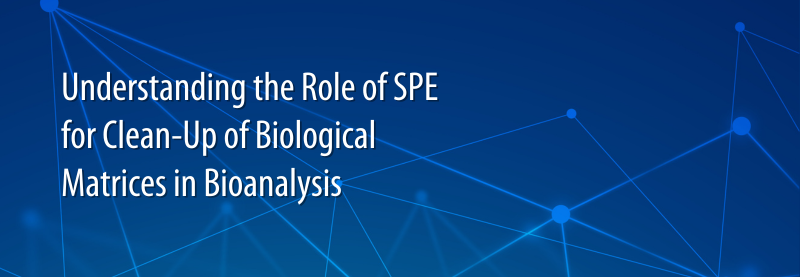Separation Science, in collaboration with Waters, has developed a series of open-access online LC learning courses covering choosing base particles, ligands and hardware for robust chromatographic separations. We are pleased to offer a new full course focusing on solid-phase extraction:

When performing quantitative bioanalytical methods, understanding how to prepare a sample for analysis requires several considerations. This course will introduce all common types of sample preparation used in the bioanalytical laboratory space and then will focus primarily on solid-phase extraction (SPE) which yields the highest cleanliness of sample extracts.
Gaining a fundamental understanding of how SPE works, what benefits SPE provides, and what SPE devices are available in the laboratory will be a main focus, from learning about reversed-phase and mixed-mode ion exchange retention mechanisms, to selecting a sorbent, device format, and processing method. Finally, calculations for successful method design and tips for troubleshooting and method optimization will be covered. The course comprises the following modules:
- The Benefits of Good Sample Preparation
- SPE Retention: Reversed-Phase and Mixed-Mode
- The Electrospray Process and Impact of Common Matrix Ions on an LC-MS Method
- Selecting a Sorbent, Format, and Starting Method
- Before You Load: Sample Matrix and Pre-Treatment
- Designing a Successful Experiment
- Optimizing Your SPE Method
Once you complete all the tutorials in this module, including answering all the quiz questions correctly, you will receive a certificate of completion.
The Presenter
Chelsea Plummer is Senior Product Marketing Managerat Waters Corporation.
Chelsea has worked with small molecules and peptides using LC-MS for over 10 years. Beginning at Purdue University, Chelsea has specialized in research of acidic biological molecules using negative ion LC-MS high resolution mass spectrometry (HRMS). Since joining Waters, she has helped customers successfully implement LC-MS workflows, from selecting a sample preparation device, to training customers on HRMS. Today, Chelsea manages the Oasis product line and focuses on small molecule applications.im manages MaxPeak High-Performance Surface Technologies as well as a variety of other programs. Prior to this position, she worked with Waters Corporation as a chemistry sales specialist and a business development manager. During her 21 years at Waters, Kim has focused on helping scientists and colleagues understand chromatographic separations and sample preparation. Before joining Waters Corporation, Kim worked as an analytical chemist at Bacardi Martini. She holds a BS in Chemistry from Ohio University.

Now that you’ve learned about SPE for cleanup of biological matrices, be sure to check out our other modules:
“Understanding LC Column Attributes - What's Important for Your Chromatography?”
Have you ever wondered how the LC column creates a separation? What attributes are important, what do they do, and how to use them to your advantage? This open-access course is designed to take you from beginner to advanced in understanding column selection and method development. It will cover the key aspects of the LC column from the base particle to the bonded phase and even the hardware.
“How to improve method robustness through control of unwanted interactions”
Successful chromatographic separations are as much about preventing the interactions you don’t want, as it is about creating the interactions you need. This open-access course is designed to take you from beginner to advanced in controlling the interactions within your chromatographic separations. It will cover how to improve method robustness through the prevention of analyte loss, with improved confidence in the quality of your data.
"Size exclusion chromatography overview of the principles and techniques
to obtain reliable protein size-based-separations"
Size-Exclusion Chromatography (SEC) is a powerful technique for protein characterization that requires an understanding of the principles to be successful. In this open-access course, we will discuss the history and science of SEC, its strengths and limitations, and how to get the most from this important analytical technique. We’ll also discuss the analytical challenges with a focus on monoclonal antibody separations and the effective use of LC-based, size-exclusion chromatography to obtain reliable mAb aggregate, monomer, and fragment analyses.





